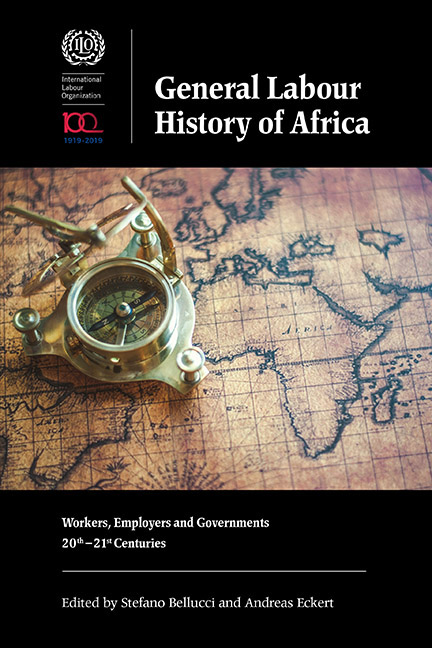Book contents
- Frontmatter
- Contents
- List of Maps and Figures
- List of Tables
- Notes on Contributors
- Foreword
- Acknowledgements
- The ‘Labour Question’ in Africanist Historiography
- Part I Free and Unfree Labour
- Part II Key Sectors
- 4 Agriculture
- 5 Mining
- 6 Industry and Manufacturing
- 7 Transport
- Part III International Dimensions and Mobility
- Part IV Varieties of Work
- Part V Entrepreneurs and Self-Employment
- Part VI The State, Unions and Welfare
- Part VII Conclusions
- Select Bibliography
- Index
4 - Agriculture
from Part II - Key Sectors
Published online by Cambridge University Press: 21 September 2019
- Frontmatter
- Contents
- List of Maps and Figures
- List of Tables
- Notes on Contributors
- Foreword
- Acknowledgements
- The ‘Labour Question’ in Africanist Historiography
- Part I Free and Unfree Labour
- Part II Key Sectors
- 4 Agriculture
- 5 Mining
- 6 Industry and Manufacturing
- 7 Transport
- Part III International Dimensions and Mobility
- Part IV Varieties of Work
- Part V Entrepreneurs and Self-Employment
- Part VI The State, Unions and Welfare
- Part VII Conclusions
- Select Bibliography
- Index
Summary
Agriculture has been the most important economic activity and socially structuring force around the world until very recently – and it still is for many people. While the ratio of urban residents is constantly rising in Africa, 63.9 per cent of its population were still living in rural areas as recently as 2011. However, neat statistical divisions into urban and rural areas, agricultural and non-agricultural occupations do not capture the much more intertwined reality of African labour relations. Today and throughout history, households have adopted diversified livelihood strategies combining food production and the selling of agricultural surpluses with non-farming activities, which are becoming increasingly important. However, compared to other regions of the world, agricultural work still looms large on the African continent.
Agricultural labour has not been at the core of conventional labour history, which was for a long time preoccupied with industrial and urban work, class formation and proletarianization. Agricultural history in its early variants focused on commercialization and colonialism, outlining how agricultural production and labour relations transformed under capitalism. Case studies showed how companies and colonial governments drove Africans towards producing particular cash crops, entangling peasantries in global networks of production and consumption under often disadvantageous terms of trade. On the other hand, important studies showed that African farmers were also active agents of commercialization and complicated existing models of agrarian capitalism, arguing, for instance, that accumulation and differentiation among farmers occurred unhindered by communal tenure or expectations of kin. In line with broader trends in African labour history, studies from about the 1980s and 1990s shifted away from the earlier structural focus towards asking how African producers experienced, shaped and resisted commercialization and colonial agricultural planning.
Some of the still-existing lacunae pertain to categories of dependent agricultural work, particularly agricultural wage labour, since historians have focused on peasants. Moreover, environmental historians have rightly deplored the lack of systematic engagement with ecological factors, as only a few studies address the ways in which agricultural labour has been shaped by climate, topography, soil quality or short-term events such as droughts or pests. Recently, global or transnational perspectives, also under the umbrella of Global Labour History (GLH), have opened up new research fields for the history of agricultural work, including transnational entanglements in terms of agricultural knowledge and technology.
- Type
- Chapter
- Information
- General Labour History of AfricaWorkers, Employers and Governments, 20th-21st Centuries, pp. 119 - 150Publisher: Boydell & BrewerPrint publication year: 2019



